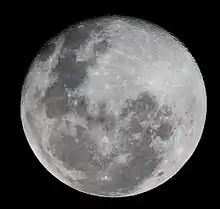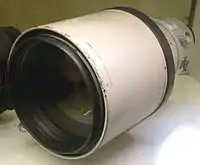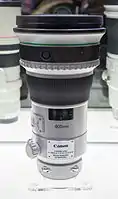
The Canon EF 400mm are seven super-telephoto lenses made by Canon. These lenses have an EF mount that work with the EOS line of cameras. These lenses are widely used by sports and wildlife photographers.[1]
Canon has manufactured four 400mm prime lenses:
- EF 400mm f/2.8L IS III USM
- EF 400mm f/2.8L IS II USM[2]
- EF 400mm f/4 DO IS II USM
- EF 400mm f/5.6L USM
The 400mm f/4 DO IS II USM, which replaced an earlier version of the same lens in 2014,[3] is one of only two Canon lenses that make use of diffractive optics (the other is the EF 70–300mm f/4.5–5.6 DO IS USM). The use of diffractive optics allows the lens to be significantly lighter than it might otherwise be.[4][5]
These lenses are compatible with the Canon Extender EF teleconverters.
Specifications of the EF 400mm lenses
| Attribute | f/2.8L USM | f/2.8L II USM | f/2.8L IS USM | f/2.8L IS II USM | f/2.8L IS III USM | f/4 DO IS USM | f/4 DO IS II USM | f/5.6L USM |
|---|---|---|---|---|---|---|---|---|
| Image |  |
 |
 |
 | ||||
| Key features | ||||||||
| Full-frame compatible | ||||||||
| Image stabilizer | ||||||||
| Ultrasonic Motor | ||||||||
| L-series | ||||||||
| Diffractive Optics | ||||||||
| Macro | ||||||||
| Technical data | ||||||||
| Aperture (max-min) | f/2.8-f/32 | f/4-f/32 | f/5.6-f/32 | |||||
| Construction | 9 groups / 11 elements | 13 groups / 17 elements | 12 groups / 18 elements | 6 groups / 7 elements | ||||
| # of diaphragm blades | 8 | 9 | 8 | 9 | 8 | |||
| Closest focusing distance | 4 meters | 3 m | 2.7 m | 2.5 m | 3.5 m | 3.3 m / 10.83 ft | 3.5 m | |
| Max. magnification | 0.11× | 0.15× | 0.17× | 0.12× | 0.13× | 0.11× | ||
| Horizontal viewing angle | 5°10' | |||||||
| Vertical viewing angle | 3°30' | |||||||
| Diagonal viewing angle | 6°10' | |||||||
| Physical data | ||||||||
| Weight | 13.44 lb / 6.1 kg | 13.03 lb / 5.91 kg | 11.83 lb / 5.37 kg | 8.48 lb / 3.85 kg | 2.840 kilograms (6.26 lb) | 4.27 lb / 1.94 kg | 4.63 lb / 2.10 kg | 2.8 lb / 1.25 kg |
| Maximum diameter | 6.57" / 167mm | 6.41" / 163mm | 5.03" / 128mm | 5.04" / 128mm | 3.54" / 90mm | |||
| Length | 13.70" / 348mm | 13.74" / 349mm | 13.50" / 343mm | 9.16" / 232.7mm | 9.18" / 232.7mm | 10.09" / 256.5mm | ||
| Filter diameter | 48mm | 52mm drop-in filter | 77mm | |||||
| Accessories | ||||||||
| Lens hood | ET-161B II | ET-155 | ET-155 (WII) | ET-120 | ET-120 (WII) | Built-in | ||
| Case | 400 | 400C | 400E | 400B | 400D | LH-D29 | ||
| Retail information | ||||||||
| Release date | April 1991 | March 1996 | September 1999 | August 2011 | December 2018 | December 2001 | September 2014 | May 1993 |
| Currently in production? | ||||||||
| MSRP $ | 870,000 yen | 980,000 yen | $7,999 | $9,999 | $11,999 | $6,469 | $6,899 | $1,249 |
Use in astronomy
Canon 400 mm f/2.8 L IS II USM lenses are used in the Dragonfly Telephoto Array.[7] The array is designed to image astronomical objects with low surface brightness such as some satellite galaxies.[8][7] The array started with three lenses but this has since increased to 24 with plans for 50.[7][8]
References
- ↑ the-digital-picture.com
- ↑ usa.canon.com
- ↑ "Canon U.S.A. Celebrates 75 Years Of Optics Heritage With The Addition Of Three New Lenses" (Press release). Canon U.S.A. September 15, 2014. Retrieved September 15, 2014.
- ↑ the-digital-picture.com
- ↑ the-digital-picture.com
- ↑ Rumors, Canon (2021-04-08). "Canon officially discontinues a lot more EF lenses". Canon Rumors - Your best source for Canon rumors, leaks and gossip. Retrieved 2021-04-09.
- 1 2 3 Abraham, Roberto G; van Dokkum, Pieter G (2014). "Ultra–Low Surface Brightness Imaging with the Dragonfly Telephoto Array". Publications of the Astronomical Society of the Pacific. 126 (55): 55–69. arXiv:1401.5473. Bibcode:2014PASP..126...55A. doi:10.1086/674875. S2CID 119197160.
- 1 2 Barss, Patchen (28 January 2016). "How to Discover a Galaxy with a Telephoto Lens". Nautilus. NautilusThink Inc. Retrieved 4 May 2017.